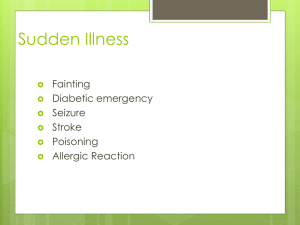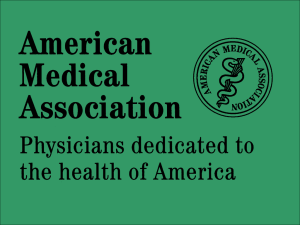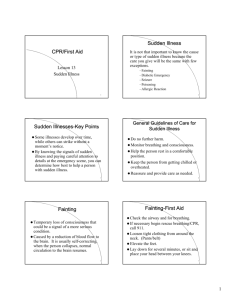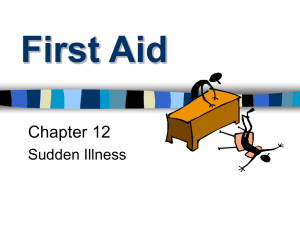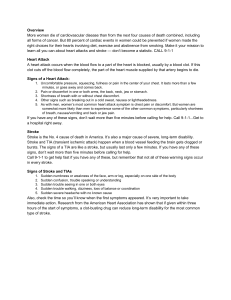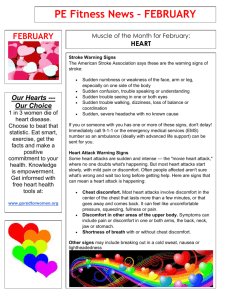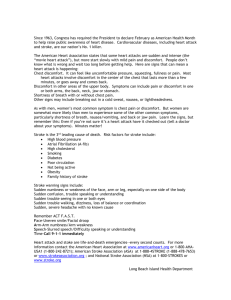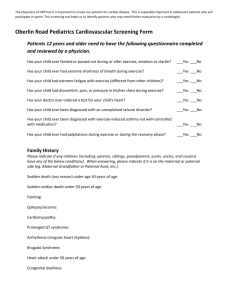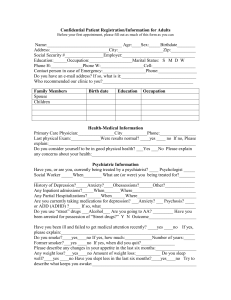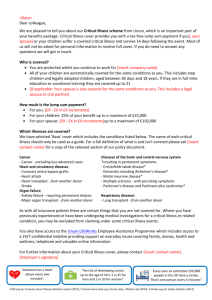poisoning allergic
advertisement
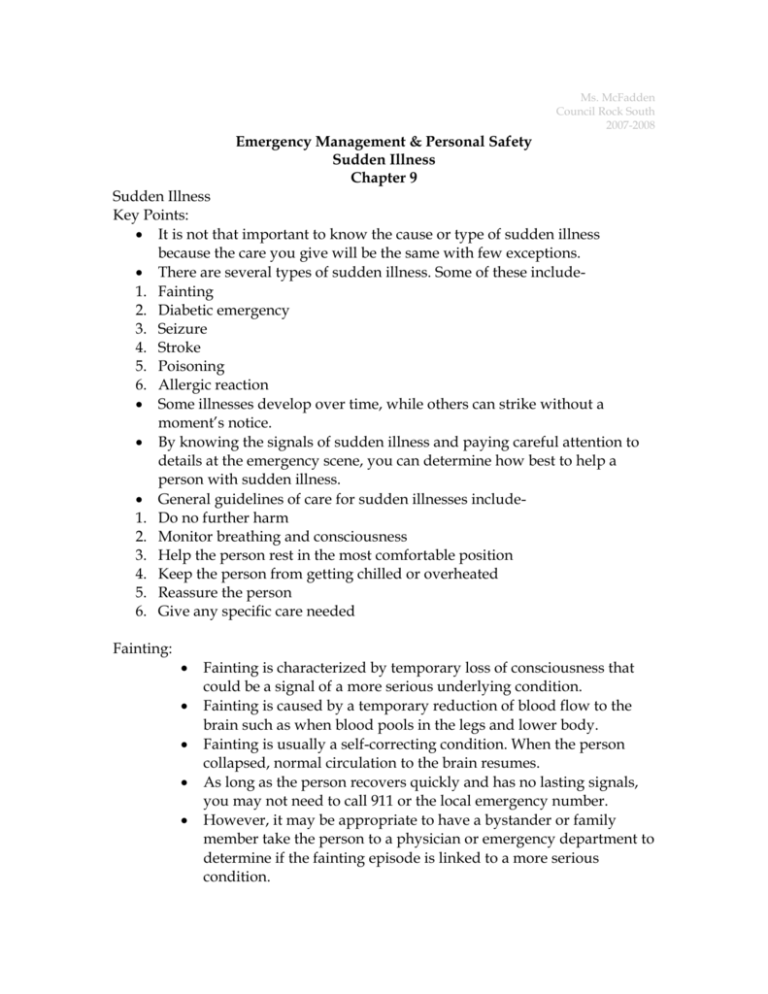
Ms. McFadden Council Rock South 2007-2008 Emergency Management & Personal Safety Sudden Illness Chapter 9 Sudden Illness Key Points: It is not that important to know the cause or type of sudden illness because the care you give will be the same with few exceptions. There are several types of sudden illness. Some of these include1. Fainting 2. Diabetic emergency 3. Seizure 4. Stroke 5. Poisoning 6. Allergic reaction Some illnesses develop over time, while others can strike without a moment’s notice. By knowing the signals of sudden illness and paying careful attention to details at the emergency scene, you can determine how best to help a person with sudden illness. General guidelines of care for sudden illnesses include1. Do no further harm 2. Monitor breathing and consciousness 3. Help the person rest in the most comfortable position 4. Keep the person from getting chilled or overheated 5. Reassure the person 6. Give any specific care needed Fainting: Fainting is characterized by temporary loss of consciousness that could be a signal of a more serious underlying condition. Fainting is caused by a temporary reduction of blood flow to the brain such as when blood pools in the legs and lower body. Fainting is usually a self-correcting condition. When the person collapsed, normal circulation to the brain resumes. As long as the person recovers quickly and has no lasting signals, you may not need to call 911 or the local emergency number. However, it may be appropriate to have a bystander or family member take the person to a physician or emergency department to determine if the fainting episode is linked to a more serious condition. Diabetic emergency: The condition in which the body does not produce enough insulin or does not use insulin effectively is called diabetes mellitus. If the person is conscious and able to swallow, give him or her sugar in the form of fruit juice, candy, a non-diet soda drink or table sugar, either dry or dissolved in a glass of water. If the person is not able to swallow or a form of sugar is not readily available, call 911 or the local emergency number. Seizures: When injury, disease, fever, poisoning or infection disrupts normal functions of the brain, the electrical activity of the brain becomes irregular. This irregularity can cause a sudden loss of body control known as a seizure. If a person is having a seizure, protect him or her from injury. Remove nearby objects that can cause injury. Protect the person’s head. Call 911 or the local emergency number for any of the following situations1. The seizures last for more than 5 minutes. 2. The person has repeated seizures, without regaining consciousness. 3. The person has diabetes or is pregnant. 4. The person fails to regain consciousness after a seizure. Stroke: A Stroke, also called a “brain attack” is a blockage of blood flow to a part of the brain. It can cause permanent damage to the brain if the blood flow is not restored. Sudden signals of a stroke include1. Weakness or numbness on one side including face or arm or leg. 2. Difficulty speaking or slurred speech. 3. Sudden dizziness. 4. Blurred vision or sudden severe headache. For a brain attack, think FAST 1. 2. 3. 4. Face- Weakness on one side of the face Arm- Weakness or numbness in one arm Speech- Slurred speech or trouble getting the words out. Time- Time to call 911 if you see any of these signals. Note the time that the signals began. Stay with the person and monitor his or her breathing and other signs of life. If the person is conscious, check for non- life threatening conditions. If you see signals of a stroke, call 911 or the local emergency number immediately. Poisoning: A poison is any substance that can cause injury, illness or death when introduced in to the body Poisons enter the body in four ways1. Inhalation 2. Swallowed 3. Absorption 4. Injection If there is a life-threatening condition found (e g: a person, who has an altered level of consciousness, is unconscious or not breathing), call 911 or the local emergency number first. If you think someone has been poisoned, call the poison Control Center (PCC) and follow their directions. Allergic Reactions: Insect bites or stings or contact with certain drugs, medications, foods and chemicals can cause an allergic reaction. If the person is suffering a severe allergic reaction from an insect bite or sting, or from eating a certain type of food, use the emergency action steps, CHECK-CALL-CARE and give care for any life-threatening conditions. The person may have a medical kit (such as an epinephrine auto-injectors) to treat a severe allergic reaction known as anaphylaxis. Assist the person as needed with using the kit until help arrives. You may need to have special training in order to assist with this medication. Special Considerations when Caring for Children: Children have unique needs that require a special type of care. Caring for an injured or ill child requires that a responder recognize the child’s fear and anxiety. There are important characteristics to remember when checking a child. 1. Checking a conscious infant or child’s condition can be difficult, especially if he or she does not know you. 2. At certain ages, infants and children do not readily accept strangers. Remember when checking a child to1. Obtain consent from a parent or guardian if present. 2. Observe the child. Do not rush up and touch the child. 3. Remain calm. Children will be more upset if you are excited. 4. Talk directly to the child and explain what you plan to do, if the child is able to speak. Talk clearly and use simple terms. 5. Do not separate a child from loved ones. 6. Start to check at the toes and work toward the head. 7. Gain their trust through your actions. Special Considerations when Caring for an Older Adult: 1. 2. 3. 4. Caring for an older (elderly) adult requires that you keep in mind special problems and concerns. Often the problem seems unimportant to an older adult. Often the loss of independence will cause an older adult to seek treatment. Do not talk “down” to an older adult as if the person were a child. If appropriate, the older adults should be taken to a facility for medical treatment. Falls are a common cause of injury for the elderly. When injuries are caused by falls, always suspect head, neck, back, or hip injuries. Sometimes, the signals of a serious injury may not occur for several days. Therefore, individuals close to the elderly person should be alert to signals of unusual behavior. Closing Sudden illness can strike anyone, at any time. Even if you do not know the cause of the illness, you can still give proper care. Knowing the signals of sudden illness will help you determine the necessary care to give the person until EMS personnel arrives.
